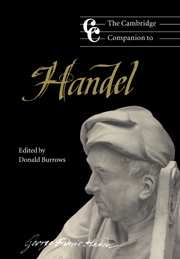Book contents
- Frontmatter
- Introduction
- Part I Background
- Part II The music
- 8 Handel and the aria
- 9 Handel's compositional process
- 10 Handel and the idea of an oratorio
- 11 Handel's sacred music
- 12 Handel's chamber music
- 13 Handel as a concerto composer
- 14 Handel and the keyboard
- Part III The music in performance
- Bibliographical note
- Notes
- List of Handel's works
- Index
14 - Handel and the keyboard
from Part II - The music
Published online by Cambridge University Press: 28 September 2011
- Frontmatter
- Introduction
- Part I Background
- Part II The music
- 8 Handel and the aria
- 9 Handel's compositional process
- 10 Handel and the idea of an oratorio
- 11 Handel's sacred music
- 12 Handel's chamber music
- 13 Handel as a concerto composer
- 14 Handel and the keyboard
- Part III The music in performance
- Bibliographical note
- Notes
- List of Handel's works
- Index
Summary
Handel is remembered above all as a great composer for the human voice, the creator of operas, cantatas, anthems and oratorios; but in his lifetime he was also renowned as a brilliant keyboard player. As well as displaying his gift for improvisation, for which he was particular admired, he composed some superb music for keyboard instruments. The organ concertos of his later years were written for public performance, but his harpsichord music was no doubt composed for his own pleasure, the enjoyment of his friends and the instruction of his pupils; most of it was written by the time he was thirty-five, and was concentrated into two comparatively brief periods of his life.
The first of these periods covers his earliest years up to 1706, which is not surprising when we consider that the training he received as a boy in Halle from the excellent Zachow laid considerable emphasis on music for keyboard instruments. Zachow's world was that of the seventeenthcentury German Protestant organist, whose art was based on the solemn counterpoint of the Lutheran chorale, on the well-wrought fugue, the church cantata, and sets of variations on choral tunes, with some light relief in suites and chaconnes in the French style. Earlier in the century French composers had developed a true harpsichord idiom distinct from that of the organ, involving among other techniques the style brisé accompaniments used by lutenists; but although their influence on German keyboard music after 1650 was considerable, initially conveyed through the works of Froberger, the distinction between the textures and figurations appropriate for the harpsichord and those for the organ was hardly observed in Germany.
- Type
- Chapter
- Information
- The Cambridge Companion to Handel , pp. 208 - 224Publisher: Cambridge University PressPrint publication year: 1997
- 1
- Cited by



